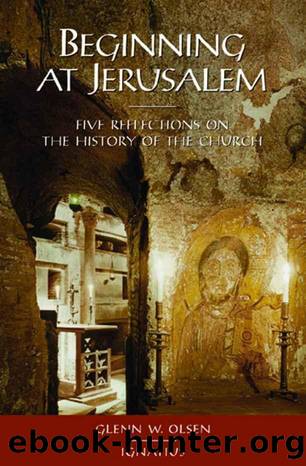Beginning At Jerusalem by Olsen Glenn W

Author:Olsen, Glenn W. [Olsen, Glenn W.]
Language: eng
Format: epub
Tags: Spiritual & Religion
ISBN: 089870992x
Publisher: Ignatius Press
Published: 2010-10-28T16:00:00+00:00
V
The Church at the Turn
to the Third Millennium
In the last chapter I gave some consideration to the views of the French thinker Marcel Gauchet, who believes that after two thousand years, the Christian era stands at its end.1 With many others Gauchet thinks that the twenty-first century will be a postreligious age, secular and centered on the values of âautonomy, democracy, science, and capitalismâ.2 Gauchet is far from the first person to say this. In the nineteenth century Ludwig Feuerbach (1804-1872) assailed Christianity, and Friedrich Nietzsche (1844-1900) proclaimed God dead.3 One may recall André Malrauxâs (1901-1976) dictum that âthe twenty-first century will be a religious century or it will be nothing at allâ, but this does not make Gauchet wrong. Gauchetâs view is not that the churches will empty, but that the religion found in those churches, in its relationship to the past, âalready inhabits a post-religious landscapeâ.4 To the extent that the citizens of the democratic societies think about such matters, their thought is largely given to accommodating whatever religion remains to the world outside the churches. As Karl Barth observed of nineteenth-century Protestant theology, the world already sets the expectations to which Christianity must conform.5 Even if disillusioned and no longer believing that the rapid changes of the contemporary era really mark human progress, such believers see no alternative than simply to âhold on for the rideâ.
In response to such attitudes and views, toward the end of the second millennium Pope John Paul II issued an apostolic letter, Tertio Millenio Adveniente, on how Catholics were to prepare themselves for the celebration of the arrival of the third millennium and on how they were to live in that millennium.6 This letter presented possibilities very different from those offered by the tired liberalism Gauchet quite accurately describes.7 The Popeâs letter and the opportunities it presents are the subject of the present chapter. In brief, I wish to suggest that we now have enough distance on modernity to see at least many of its delusions or limitations and to work for a postmodern world that, to stay for the moment with Gauchetâs way of defining terms, is more post-secular than postreligious.8
My own view on such matters is in fact closer to that of Alan Ryan than it is to Gauchet. In the light of such developments as the growth of religious fundamentalism, often in close union with modernization, Ryan sees no reason to describe either the twentieth or some conceivable future century as simply secular.9 Obviously much depends on how one defines terms. To keep things simple, we can define secularization in two quite different ways. First, secularization can denominate any process that leads to greater understanding of the saeculum (the temporal world or age), usually to the end of greater mastery of the world or âfeeling at homeâ within it. Such secularization, say, the discovery of fire, has been going on a very long time and may mark a progress in human affairs. It was especially the subject of Chapter Three above.
Download
This site does not store any files on its server. We only index and link to content provided by other sites. Please contact the content providers to delete copyright contents if any and email us, we'll remove relevant links or contents immediately.
| Africa | Americas |
| Arctic & Antarctica | Asia |
| Australia & Oceania | Europe |
| Middle East | Russia |
| United States | World |
| Ancient Civilizations | Military |
| Historical Study & Educational Resources |
The Battle of Mogadishu by Matt Eversmann & Dan Schilling(745)
The Confidence Men by Margalit Fox(704)
The Spymaster of Baghdad by Margaret Coker(673)
A History of the Muslim World since 1260: The Making of a Global Community by Vernon O. Egger(661)
Jack the Ripper and the East End by Peter Ackroyd(633)
Empire of Fear: Inside the Islamic State by Andrew Hosken(610)
The Afghanistan File by Prince Turki AlFaisal Al Saud(606)
Akhenaten by Dominic Montserrat(601)
The Crimean War by Winfried Baumgart(601)
Islam At The Gates: How Christendom Defeated the Ottoman Turks by Diane Moczar(599)
The Jerusalem Diamond by Noah Gordon(592)
Beirut 2020 by Charif Majdalani(584)
The History of Jihad by Robert Spencer(582)
A Concise History of Greece (Cambridge Concise Histories) by Richard Clogg(576)
The Privatization of Israeli Security by Shir Hever(556)
Israel: Ancient Kingdom or Late Invention? by Daniel I. Block(556)
Enemy in the East by Rolf-Dieter Müller(556)
The Nine Lives of Pakistan by Declan WALSH(540)
Destroying a Nation: The Civil War in Syria by Nikolaos van Dam(540)
